| Listing 1 - 10 of 25 | << page >> |
Sort by
|
Book
ISBN: 0713152699 0713152702 Year: 1967 Publisher: London : Edward Arnold,
Abstract | Keywords | Export | Availability | Bookmark
 Loading...
Loading...Choose an application
- Reference Manager
- EndNote
- RefWorks (Direct export to RefWorks)
Book
ISBN: 034057805X Year: 1993 Publisher: London ; Sydney ; Auckland Hodder & Stoughton
Abstract | Keywords | Export | Availability | Bookmark
 Loading...
Loading...Choose an application
- Reference Manager
- EndNote
- RefWorks (Direct export to RefWorks)
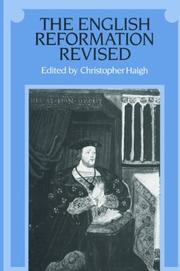
ISBN: 0521336317 0521333377 0511622112 9780521336314 9780511622113 9780521333375 Year: 1987 Publisher: Cambridge
Abstract | Keywords | Export | Availability | Bookmark
 Loading...
Loading...Choose an application
- Reference Manager
- EndNote
- RefWorks (Direct export to RefWorks)
Twenty years ago, historians thought they understood the Reformation in England. Professor A. G. Dickens's elegant The English Reformation was then new, and highly influential: it seemed to show how national policy and developing reformist allegiance interacted to produce an acceptable and successful Protestant Reformation. But, since then, the evidence of the statute book, of Protestant propagandists and of heresy trials has come to seem less convincing, Neglected documents, especially the records of diocesan administration and parish life, have been explored, new questions have been asked - and many of the answers have been surprising. Some of the old certainties have been demolished, and many of the assumptions of the old interpretation of the Reformation have been undermined, in a wide-ranging process of revision. But the fruits of the new 'revisionism' are still buried in technical academic journals, difficult for students and teachers to find and to use. There is no up-to-date textbook, no comprehensive new survey, to challenge the orthodoxies enshrined in older works. This volume seeks to fulfill two crucial needs for students of Tudor England. First, it brings together some of the most readable of the recent innovative essays and articles into a single book. Second, it seeks to show how a new 'revisionist' interpretation of the English Reformation can be constructed, and examines its strengths and weaknesses. In short, it is an alternative to a new textbook survey - until someone has time (and courage) to write one. The new Introduction sets out the framework for a new understanding of the Reformation, and shows how already published work can be fitted into it. The nine essays (one printed here for the first time) provide detailed studies of particular problems in Reformation history, and general surveys of the progress of religious change. The new Conclusion tries to plug some of the remaining gaps, and suggests how the Reformation came to divide the English nation. It is a deliberately controversial collection, to be used alongside existing textbooks and to promote rethinking and debate.
History of the United Kingdom and Ireland --- Christian church history --- anno 1500-1599 --- Great Britain --- Reformation --- England --- Church history --- 284.1 <41> --- Lutheraanse hervorming. Reformatie van Luther--Verenigd Koninkrijk van Groot-Brittannië en Noord-Ierland --- 284.1 <41> Lutheraanse hervorming. Reformatie van Luther--Verenigd Koninkrijk van Groot-Brittannië en Noord-Ierland --- English Reformation --- Arts and Humanities --- History --- Reformation - England --- England - Church history - 16th century
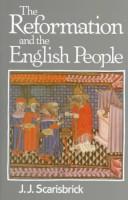
ISBN: 0631134247 Year: 1985 Publisher: Oxford Blackwell
Abstract | Keywords | Export | Availability | Bookmark
 Loading...
Loading...Choose an application
- Reference Manager
- EndNote
- RefWorks (Direct export to RefWorks)
England --- Church history --- --Lutheraanse hervorming. Reformatie van Luther--Verenigd Koninkrijk van Groot-Brittannië en Noord-Ierland --- Reformation --- 284.1 <41> --- English Reformation --- 284.1 <41> Lutheraanse hervorming. Reformatie van Luther--Verenigd Koninkrijk van Groot-Brittannië en Noord-Ierland --- Lutheraanse hervorming. Reformatie van Luther--Verenigd Koninkrijk van Groot-Brittannië en Noord-Ierland
Book
ISBN: 9781108829991 1108829996 9781108820493 1108820492 9781108900157 110890209X 1108900151 1108901476 Year: 2020 Publisher: Cambridge, United Kingdom Cambridge University Press
Abstract | Keywords | Export | Availability | Bookmark
 Loading...
Loading...Choose an application
- Reference Manager
- EndNote
- RefWorks (Direct export to RefWorks)
"The protracted religious revolution of the sixteenth and seventeenth centuries involved a concerted attempt to reshape social memory. It repudiated some key aspects of medieval commemorative culture, rehabilitated others in a modified guise, and created new modes of memorialisation, which were embodied in texts, material objects, physical buildings, rituals, and bodily gestures. This volume places these complex developments under the microscope. It also investigates the retrospective process, involving amnesia and reinvention, by which the English Reformation became a historic event. Examining the dissident as well as the official dimensions of this story, this richly illustrated, interdisciplinary collection traces how memory of the English Reformation evolved in the two centuries following the Henrician schism. Moving beyond the heated debates that have taken place about its nature, success and significance, it diverts attention towards the ways in which the Reformation entered and embedded itself in the cultural imagination"--
Reformation --- English Reformation --- England --- Church history --- Social life and customs --- 284.1 <41> --- 284.1 <41> Lutheraanse hervorming. Reformatie van Luther--Verenigd Koninkrijk van Groot-Brittannië en Noord-Ierland --- Lutheraanse hervorming. Reformatie van Luther--Verenigd Koninkrijk van Groot-Brittannië en Noord-Ierland
Book
ISBN: 9781441181176 Year: 2012 Publisher: London Bloomsbury
Abstract | Keywords | Export | Availability | Bookmark
 Loading...
Loading...Choose an application
- Reference Manager
- EndNote
- RefWorks (Direct export to RefWorks)
Christian spirituality --- Christian church history --- anno 1500-1799 --- Great Britain --- 284.1 <41> --- 27 <41> "15" --- 284.1 <41> Lutheraanse hervorming. Reformatie van Luther--Verenigd Koninkrijk van Groot-Brittannië en Noord-Ierland --- Lutheraanse hervorming. Reformatie van Luther--Verenigd Koninkrijk van Groot-Brittannië en Noord-Ierland --- Kerkgeschiedenis--Verenigd Koninkrijk van Groot-Brittannië en Noord-Ierland--?"15"
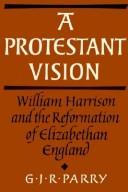
ISBN: 0521329973 0521522188 0511560761 Year: 1987 Publisher: Cambridge : Cambridge University Press,
Abstract | Keywords | Export | Availability | Bookmark
 Loading...
Loading...Choose an application
- Reference Manager
- EndNote
- RefWorks (Direct export to RefWorks)
This book deals with the thought of William Harrison, a well-known Elizabethan intellectual, whose ideas are significant chiefly because they are often representative of the thoroughgoing Protestantism which adapted continental reformed ideas to the circumstances of Tudor England. The book explains how the mentality of Harrison, a university-trained Protestant, reveals a coherent worldview based upon a particular view of history which he applied to many areas of contemporary concern: the complete reformation of the church, the improvement of society, the removal of economic injustice, the reorientation of practical life and the restraint of the dangerous speculation current in natural philosophy. Dr Parry draws upon a unique and previously unknown manuscript source, Harrison's interpretation of world history, which provides unusually detailed information about how one individual interpreted the world.
Protestantism --- Reformation --- 284.1 <41> --- English Reformation --- Christianity --- Church history --- Protestant churches --- 284.1 <41> Lutheraanse hervorming. Reformatie van Luther--Verenigd Koninkrijk van Groot-Brittannië en Noord-Ierland --- Lutheraanse hervorming. Reformatie van Luther--Verenigd Koninkrijk van Groot-Brittannië en Noord-Ierland --- History --- Elisabeth --- Harrison, William, --- Elizabeth --- Relations with Protestants. --- England --- Great Britain --- Arts and Humanities
Book
ISBN: 9780192865724 9780192689610 Year: 2022 Publisher: Oxford Oxford University Press
Abstract | Keywords | Export | Availability | Bookmark
 Loading...
Loading...Choose an application
- Reference Manager
- EndNote
- RefWorks (Direct export to RefWorks)
How the English Reformation was Named analyzes the shifting semantics of "reformation" in England between the fifteenth and seventeenth centuries. Originally denoting the intended aim of church councils, "reformation" was subsequently redefined to denote violent revolt, and ultimately a series of past episodes in religious history. But despite referring to sixteenth-century religious change, the proper noun "English Reformation" entered the historical lexicon only during the British civil wars of the 1640s. Anglican apologists coined this term to defend the Church of England against proponents of the Scottish Reformation, an event that contemporaries singled out for its violence and illegality. Using their neologism to denote select events from the mid-Tudor era, Anglicans crafted a historical narrative that enabled them to present a pristine vision of the English past, one that they endeavored to preserve amidst civil war, regicide, and political oppression. With the restoration of the monarchy and the Church of England in 1660, apologetic narrative became historiographical habit and, eventually, historical certainty.
Christian church history --- History of the United Kingdom and Ireland --- anno 1400-1499 --- anno 1500-1599 --- anno 1600-1699 --- 284.1 <41> --- 284.1 <41> Lutheraanse hervorming. Reformatie van Luther--Verenigd Koninkrijk van Groot-Brittannië en Noord-Ierland --- Lutheraanse hervorming. Reformatie van Luther--Verenigd Koninkrijk van Groot-Brittannië en Noord-Ierland
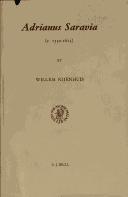
ISBN: 9004061940 9789004061941 9789004474093 Year: 1980 Volume: 21 Publisher: Leiden Brill
Abstract | Keywords | Export | Availability | Bookmark
 Loading...
Loading...Choose an application
- Reference Manager
- EndNote
- RefWorks (Direct export to RefWorks)
Saravia, Adrien, --- Saravia, Adriaen, --- 284.1 <41> --- Lutheraanse hervorming. Reformatie van Luther--Verenigd Koninkrijk van Groot-Brittannië en Noord-Ierland --- Saravia, Adrien --- 284.1 <41> Lutheraanse hervorming. Reformatie van Luther--Verenigd Koninkrijk van Groot-Brittannië en Noord-Ierland --- Zaravia, Hadrianus, --- Saravia, Hadrianus, --- Saravia, Adrianus, --- Saravia, Adriaen --- Saravia, Adrianus --- Saravia, Adrien, - 1530-1612. --- Political science --- Reformed Church --- Administration --- Civil government --- Commonwealth, The --- Government --- Political theory --- Political thought --- Politics --- Science, Political --- Social sciences --- State, The --- History of doctrines
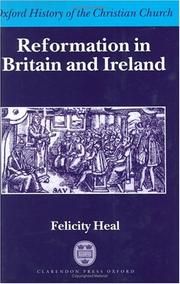
ISBN: 0198269242 0191602418 1429416602 9786610446056 1280446056 0191520586 9780198269243 Year: 2005 Volume: *3 Publisher: Oxford ; New York ; Madrid Oxford University Press
Abstract | Keywords | Export | Availability | Bookmark
 Loading...
Loading...Choose an application
- Reference Manager
- EndNote
- RefWorks (Direct export to RefWorks)
Reformation --- 283*1 --- 284.1 <41> --- 284.1 <41> Lutheraanse hervorming. Reformatie van Luther--Verenigd Koninkrijk van Groot-Brittannië en Noord-Ierland --- Lutheraanse hervorming. Reformatie van Luther--Verenigd Koninkrijk van Groot-Brittannië en Noord-Ierland --- 283*1 Anglicanisme:--16de eeuw --- Anglicanisme:--16de eeuw --- Protestant Reformation --- Church history --- Counter-Reformation --- Protestantism --- History --- Great Britain --- Ireland --- Irish Free State --- Réforme (Christianisme) --- Grande-Bretagne --- Irlande --- Histoire religieuse --- 16th century --- Reformation - Great Britain. --- Reformation - Ireland.
| Listing 1 - 10 of 25 | << page >> |
Sort by
|

 Search
Search Feedback
Feedback About UniCat
About UniCat  Help
Help News
News